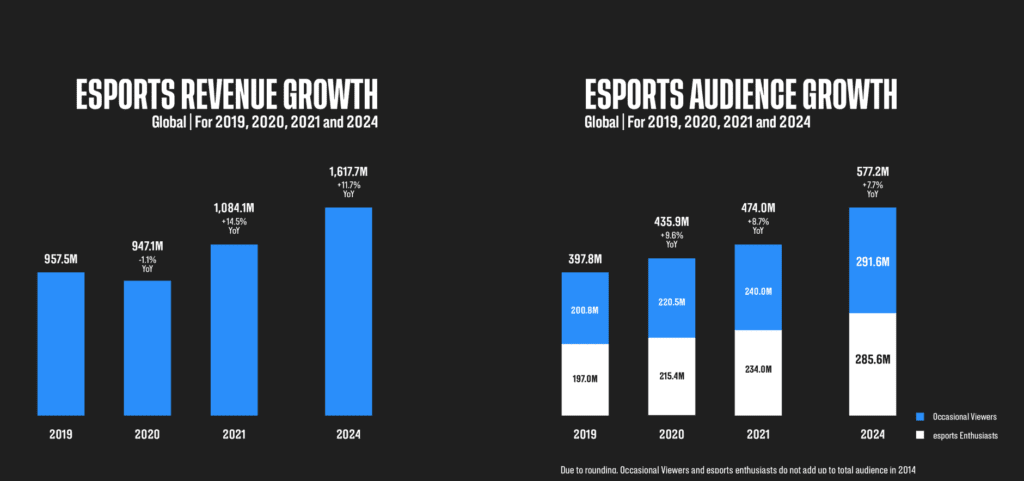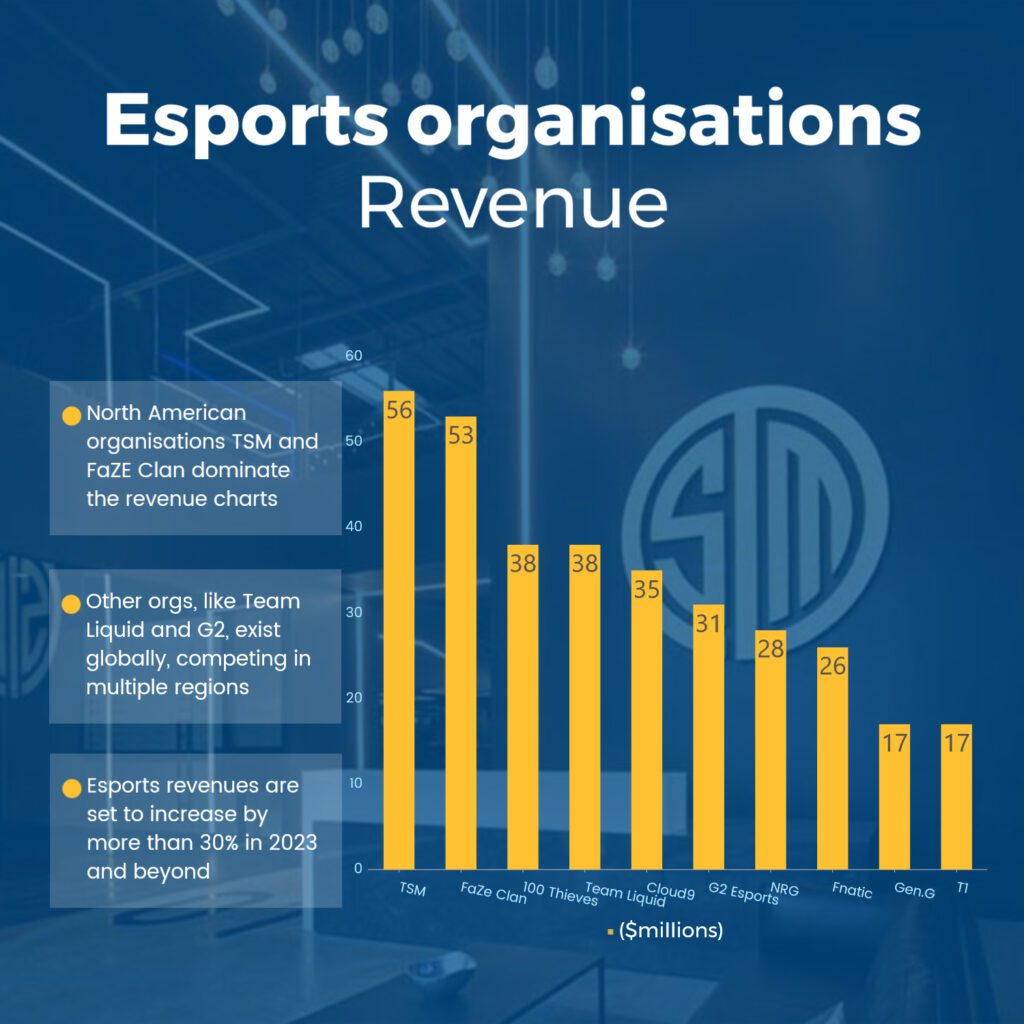As of 2022, the global esports market is estimated to be worth up to $1.38bn(USD). This, up from $947m in 2020 when the pandemic began, indicates an increase of almost 40%. As Europe’s best esports marketing agency, we’ve been diving into the figures to show exactly why every brand needs an esports strategy in 2023.
While Covid-19 certainly helped get eyes on the industry, many have stayed glued to their screens as restrictions around the world lift. Now the pandemic is all but over, things don’t appear to be slowing down, with esports global revenue projected to increase to $1.62bn. This is one of the key reasons why brands need to start considering their esports strategy. In 2023, we are only expecting further growth.
Audiences are also growing, with esports being one of the biggest online entertainment opportunities for young people today. Viewership within the esports niche is growing by millions every single year, with more than half a billion people expected to be tuning in to the biggest tournaments in the world next year.

Who is watching esports?
In 2021 esports viewing figures raised to a total of 470 million people (a mix of casual and enthusiasts), but let’s take a look at where this audience is mostly coming from.
The global average for female esports viewers is around 22%, however, this figure is expected to climb and it wouldn’t be a surprise if this number was on par with males within the next 5 years.
The age demographics show clearly that the vast majority of those people are under 35-years-old, placing esports as one of the premier opportunities for brands targeting anyone within that age bracket.
How is Gen-Z watching esports?
Traditional media usage is at an all-time low in people under the age of 30, with Variety reporting that just 10% of Gen-Z and 18% of Millennials are watching TV. Industry news site Digital Music News reported that just 22% of Gen-Z listen to the radio.
By stark contrast, 81% of Gen-Z play video games, and 75% live stream gaming or esports-focused content.
Twitch.tv and YouTube make up a huge chunk of the viewership for these kinds of streams. Some of the biggest streamers can individually bring in hundreds of thousands of concurrent viewers, which should immediately prick the ears of even the least experienced marketers among us.
Twitch, with over 3 million monthly users, is home to 8.5 million content creators, with a vast number of these focusing on gaming. Some of the platform’s biggest stars have elevated themselves far beyond the need for regular streaming, with Jake Paul, Logan Paul, KSI, and many others, becoming international sensations outside of gaming in recent years.
Much of the social pull these megastars are wielding comes from years of interpersonal relationships built online, which have snowballed into global fame.
What is there to watch?
Most professional esports follow a typical sporting season, made up of smaller local tournaments, qualifying regional tournaments, and finally “worlds” or global events, which make up the best gamers and teams in the world in their respective games.
By peak viewers, the mobile arena is doing an incredible job in keeping up with PC-focused mega games, such as League of Legends.
Garena Free Fire, a free and mobile version of the popular game Fortnite, stunned the world in 2021 when nearly 5.5m viewers tuned in to see eventual winners Phoenix Force compete for a slice of the $2m prize pool.
While esports giant League of Legends repeatedly takes the crown as one of the most popular esports in the world, peak viewership stats for big tournaments suggest it’s not as clear cut as it seems.
Free Fire World Series 2021 – 5.41m
League of Legends 2021 – 4.01m
League of Legends 2019 – 3.99m
League of Legends 2020 – 3.88m
PUBG Mobile Championship – 3.8m
M2 World Championship – 3.08m
How do I follow esports in 2023?
Following esports is made easier with a string of online portals which track results, team news, and upcoming events. Social media and chat applications also feature highly, with a majority of teams using online conference calls to play and exchange ideas and strategies.
Twitter and TikTok lead the social charge for gamers, with the two giant social media apps becoming essential for announcements, cooperation, and interactions with professional players and streamers alike.
Liquipedia is probably one of the most important resources for both casual viewers and esports enthusiasts alike. Following most major esports titles, the Wiki site, run by Team Liquid, is one of the most visited websites in competitive gaming and offers live scores, links to streams, and upcoming events for the calendar.
Tracking sites like HLTV (CS:GO) and Octane.gg (Rocket League) offer additional resources for their respective games, like in-game stats, past results, transfer rumours, and more.
Who are esports players?
One of the biggest draws to Gen-Z watching competitive esports is to learn new tips, tricks, and skills that might help the watcher compete at a higher level. Watching your favourite players can offer new ideas on how to play the game as the quality of competition improves.
However, the chances of going from amateur fan to professional gamer are incredibly slim – similar, perhaps, to becoming a professional footballer. The competition is incredibly tough and, with multi-million dollar prize pools on the line, hundreds of thousands of competitive gamers are keen to get in on the action.
While most pros stream, at least occasionally, the biggest streamers are not pro gamers, and instead lend their skills to charisma, video editing, and creativity to become giants of their own arena.
Instead, pro players are often spending their time practising in scrims (planned practice games against other pro teams) or going over new strategies with their coaches, managers, and, in some cases, performance psychologists.
Both of these categories of esports personalities offer a huge number of opportunities to brands. While streamers will certainly be happy to talk up their biggest sponsors and the team they represent, pro players will do the talking in the game by competing for the top prize pools.
What brands are already involved in esports?
It is becoming more and more common for brands to start forming their esports teams. Football clubs are probably the most common at this time, and in fact, most teams in the Premier League have their esports arm. Let’s take a look at some big brands that have founded their teams and what games they are getting involved in!
- Manchester United – eFootball
- Arsenal FC – eFootball
- FC Barcelona – eFootball, Rocket League, League of Legends
- FC Bayern Munich – eFootball
- Manchester City – FIFA, Fortnite
- PSG – FIFA, League of Legends, Dota 2, Brawl Stars
- NetEase – Overwatch
- Kraft Group – Overwatch
- Kroenke Sports & Entertainment – Overwatch, Call of Duty
- Vodafone – Valorant, CS:GO, Rocket League
Brands are increasingly looking at ways to reach new audiences in new and exciting ways, and with esports being one of the fastest-growing forms of entertainment. Total viewing figures expected to grow exponentially over the next 5 years, it’s no wonder brands are starting to develop esports strategies for 2023.
How are people making money in esports?
Esports can be a costly endeavour, with outgoings dependent on the quality of players and expected results.
However, that doesn’t mean teams aren’t making really good money.
Esports organisations find revenue through the following sources; Sponsorships, tournament winnings, streaming, advertising, and merchandise.
By 2025, esports sponsorships and ad revenue is expected to eclipse $1bn, which is a staggering amount and fueled by the ever-increasing growth in esports viewing figures.
Let’s take a look at some of the biggest esports brands and see how much revenue they made in 2021.

Revenue figures for 2022 are predicted to be much higher, even in times of economic uncertainty, esports continue to grow in both monetary terms and overall popularity.
What are the biggest commercial deals in esports in 2023?
Sponsorships and commercial deals are the bread and butter of esports. Thankfully, demand for esports content is skyrocketing and with viewing figures growing year on ye`ar, investments and sponsorship deals are going to keep growing too.
Let’s take a look at some of the biggest commercial deals in esports for 2021
- Betting giants DraftKings becomes the main sponsor of FaZe Clan
- Popular online fashion retailer ASOS partnered with Fnatic in a multimillion-pound deal
- BMW become the title sponsor of the Rocket League open and freestyle tournament
- Luxury fashion retailer Ralph Lauren partners with G2 esports
- DC comics partners with FaZe Clan to create a limited-edition comic book
- Alienware and Team Liquid agree on a 10-year extension to the current partnership deal
- Belong Gaming Arena to roll out hundreds of gaming centres across the USA
- Long-standing partners ESL & Intel commit to spending $100 Million on esports over the next 3 years
- Cryptocurrency exchange Crypto.com agree to 5 year deal with Fnatic worth $15 Million
Which sports stars have an esports strategy in 2023?
It is becoming more common in for sports stars to become invested in esports to some degree. From becoming brand ambassadors to even forming their own teams, esports is a great opportunity for lots of businesses and sporting stars.
As to why they do this, the answer is quite simple. Footballers tend to have a lot of passion for gaming, and it is widely known this is a common hobby among the elite stars. Having an esports strategy in 2023 allows them to market to new audiences, who might not be the biggest followers of their on-field performances.
For example, Liverpool FC striker Diogo Jota is considered one of the best FIFA players in the world and even took part in international qualifiers, despite having to withdraw due to scheduling conflicts with Liverpool.
Below is a list of some of the biggest names in sports and in what capacity they are involved in esports.
- David Beckham – Brand ambassador and stakeholder in Guild Esports
- Mike Tyson – Invested in esports organisation Fade 2 Karma
- Shaquille O’Neal – Invested in NRG Esports
- Michael Jordan – Invested in aXiomatic Gaming (Owners of Team Liquid)
- Sergio Aguero – Founded KRU Esports
- Casemiro – Founded Case Esports
- Jesse Lingard – Found JLINGZ esports
- Zlatan Ibrahimovic – Invested in popular esports tournament platform “Challengermode”
- Ronaldo (R9) – Invested in CNB e-Sports Club
- Gareth Bale – Founded Ellevens Esports
As you can see, this list contains some of the biggest household names in football and sport worldwide. It clearly shows that there is a growing demand for brands and global stars to start getting involved in comepting directly – and this can only mean great things for 2023.
And it’s not only sports stars getting involved in esports, but even certain A-list celebrities, like Will Smith and Drake, have gotten involved in esports investments in recent years.
“We don’t like killing” – esports for family-orientated brands
Family-focused brands like Lego or Disney, for example, can often be keen to keep it family-friendly. As a result, shooting aliens or, even worse, other players, can be off the table. Family-friendly options are incredibly important considerations for esports strategy in 2023.
If your business is also in this category and looking to enter esports to attract new fans to your audience, you would definitely want to avoid traditional esports like CS:GO or Fortnite. These games have a “killing” element, not usually considered appropriate for a young audience.
For family-based brands looking to get involved in esports, it is important to consider the age range and interests of the intended audience. Some popular esports that may be suitable for a family-based brand include:
The 10 best family-friendly esports for 2023
- FIFA – Football game suitable for all age ranges
- Rocket League – Football-based car game suitable for all age ranges
- Minecraft – Sandbox game suitable for ages 10+
- Fall Guys – Battle Royale game suitable for all ages
- Pokemon Unite – Arena battler game suitable for all ages
- Among Us – Social deception game suitable for ages 10+
- Hearthstone – Digital card game suitable for ages 7+
- Forza – Racing game suitable for all ages
- World of Tanks – MMO tank battler game suitable for ages 7+
- Pokken – Fighting game suitable for ages 7+
These games are what you would consider appropriate for a family-based audience – and are some really fun games to play and watch.
It is also worth noting that many esports games are suitable for a wide range of ages. However, some can be more intense or violent in nature and may not be suitable for all audiences. It is important for brands to research the content of any game they are considering supporting to ensure that it aligns with their values and target audience.
However, there are certainly more ways to get your brand involved. Whether that is through partnership deals with popular players/streamers of the game you want to target, or you can even look to set up and run your own tournaments – brands have found great ways to gain entry into esports in 2023.
What does Rix.Digital do in esports?
Rix.Digital is one of the best esports marketing agencies in Europe. We are doing daily consultancy with brands on how best to enter this space and how they can nail their ideal target audience. Thanks to our tailor-made approach to every client, we always find a solution that works best for all involved.
Whether you are looking to enter this space as an advertising brand, you’re a GameFi brand looking to produce regular competitive tournaments, or want to compete under your brand’s flag – we have an opportunity for you.
We have launched huge brands from scratch, helped multimillion dollar deals get over the line, and consulted on gaming and esports globally.
Rix.Digital offers a free consultation for anyone interested in the esports industry, which can be booked by our contact page.
Get your own consultation booked in today, and let’s see how Rix.Digital can develop your esports strategy for 2023 today.

